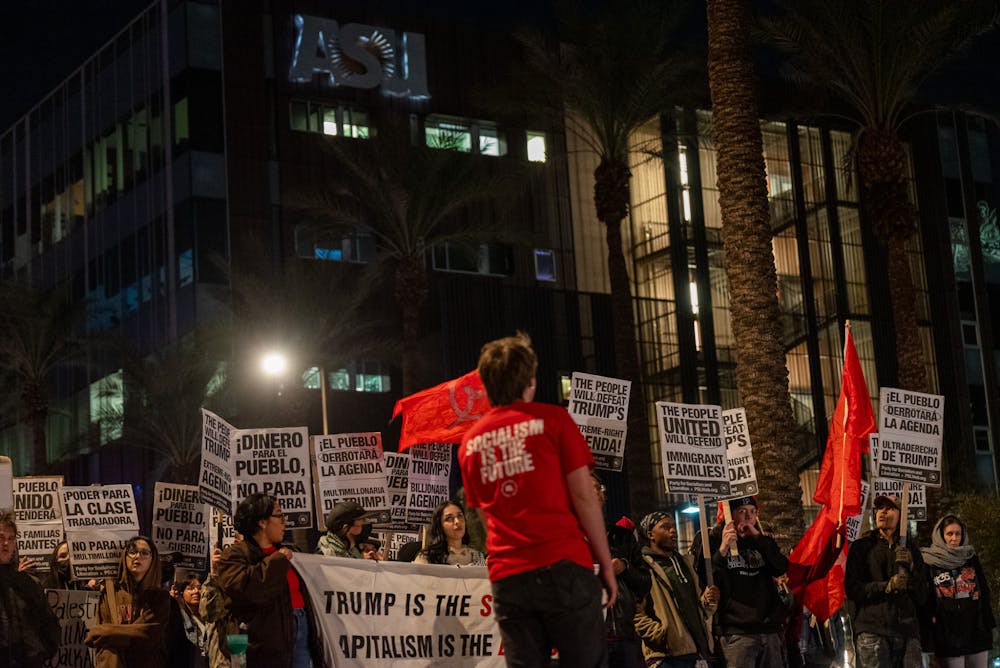Nearly 50 protesters — comprised of local activist groups and ASU students — marched through Civic Space Park in Downtown Phoenix on Monday night to speak out against President Donald Trump's inauguration and policies.
The protest took place at 5:30 p.m., just hours after Trump was sworn in as the 47th president of the United States at his inauguration ceremony in Washington D.C. The protesters began marching around 6:30 p.m.
The march went through several busy streets in the surrounding areas such as North Central Avenue, Roosevelt Row and North 7th Street.
As the protesters marched through the downtown area, residents in nearby apartment buildings shouted out of their windows and off of their balconies in support of the demonstration.
"It's just nice to see that it's not just the people who came here today, but the people in their homes, the people driving by who weren't able to make it," said Jayvon Bates, a freshman studying biology. "It's good to see that there's support outside the people who came here."
Organizations at the park advocated for policies independent of both Democrats and Republicans. The gathering was one of many in a movement of "We Fight Back" protests that happened across the country this Monday.
"It just makes me feel happy that I'm here, instead of just in my dorm, doing nothing on TikTok," Bates said. "I'm finally doing something more than just commenting on the video in support."
Several prominent social action organizations, such as the Arizona Green Party, the Trans Queer Pueblo and the Party for Socialism and Liberation Phoenix, had members publicly speak at the march.
The first speaker was Jordan Napier, a member and organizer of PSL Phoenix, who mentioned current issues within the economic, education and justice systems.
For Napier, the goal of the night was to encourage others to defend their communities and to fight for a government that would prioritize the people.
"We're saying that for the next four years, as long as Donald Trump is in office, we refuse to sit back and take it," Napier said. "The only way to create a real movement that has the ability to fight back against its oppressors is by doing exactly that: getting organized."
Much of the protest focused on the Israel-Hamas War, days after the recent ceasefire announcement.
Mohammed Riyad, the founder of the Palestinian American Community Circle, thanked the crowd for supporting Palestine.
"Before the aggression of the Gaza Strip, we were only the Palestinian community," Riyad said. "Right now, we have a bigger community. We have the pro-Palestinian community that includes all of us. So stay united. Keep united. The ceasefire happened. The war has ended, but those who committed the genocide need to be brought to justice."
Lakim Lewis interrupted during these speeches to speak out against the crowd's chants in support of Palestine, saying that Hamas should not have bombed Israel.
"I don't think that they're necessarily lying, but I think that they're hiding a part of their history that they know to be true," he said.
Lewis said he felt that speakers were not being fully truthful when speaking about the Israel-Hamas conflict.
Nicholas Brancaccio, a member of the Revolutionary Communists of America, said while he didn't anticipate a tangible "resistance" stemming from the protest, he still believed it was important to show up and demonstrate as a formality.
"There's a lot of collaborators in the state that we elected to offices recently that have proven that they don't care about their own constituents," Brancaccio said. "That just leads us to us because no one else is doing it."
Many students came to protest for similar reasons.
Luis Duque, a student studying public safety administration at Phoenix Community College, joined the protest to learn more about protesters' thoughts on Trump's immigration stance.
Duque moved to the United States when he was just two weeks old. As an immigrant himself, he is most concerned about the effects of Proposition 314 on his family.
Duque also mentioned the executive order Trump signed attempting to block birthright citizenship this Monday, a move that attorneys general from 22 states — including Arizona Attorney General Kris Mayes — have filed suit against for being "unconstitutional."
"He's going to shift families that have children that are born here," Duque said.
Edited by George Headley, Sophia Ramirez, Alysa Horton, and Katrina Michalak.
Reach the reporters at ehprest1@asu.edu and pkfung@asu.edu and follow @ellis_reports and @FungPippa on X.
Like The State Press on Facebook and follow @statepress on X.
Pippa is a sophomore studying journalism and mass communication with minors in political science and German. This is her third semester with The State Press. She has also worked at Blaze Radio and the Los Alamos National Lab.
Ellis is a sophomore studying journalism and mass communication. This is her first semester with The State Press. She has also worked at Arizona PBS and Blaze Radio.




